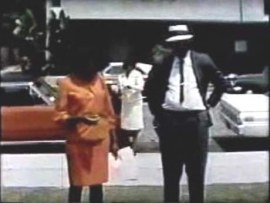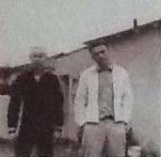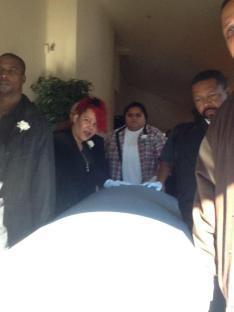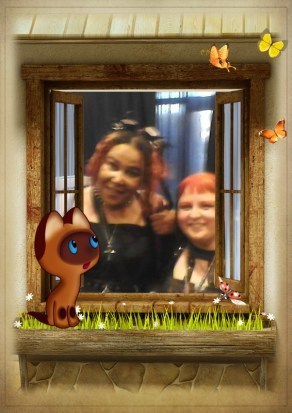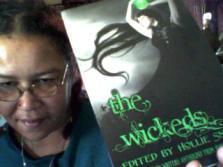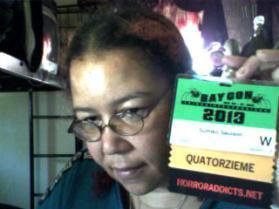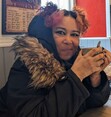Sumiko Saulson's Blog, page 48
June 10, 2013
Interview with Mark Matthews, author of “On the Lips of Children”
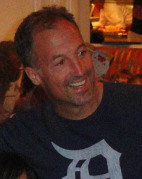 Mark Matthews is the author of three novels, a recovering alcoholic and addict, and a therapist who has worked in the behavioral health field for nearly twenty years, including psychiatric hospitals, substance abuse treatment, and runaway shelters. He has run in thirteen marathons, has two children, and writers have always been his heroes. He is a licensed professional counselor who has worked for many years as a therapist, but many more years as a writer. His first novel, Stray, is based on experiences working in a treatment center with an animal shelter right next door within barking distance. His second novel, The Jade Rabbit, is the story of a woman, adopted from China as an infant, who now manages a runaway shelter in Detroit and runs marathons to cope with her stress. He is a graduate of the University of Michigan, an avid hockey fan, and lives near Detroit with his wife and two daughters.
Mark Matthews is the author of three novels, a recovering alcoholic and addict, and a therapist who has worked in the behavioral health field for nearly twenty years, including psychiatric hospitals, substance abuse treatment, and runaway shelters. He has run in thirteen marathons, has two children, and writers have always been his heroes. He is a licensed professional counselor who has worked for many years as a therapist, but many more years as a writer. His first novel, Stray, is based on experiences working in a treatment center with an animal shelter right next door within barking distance. His second novel, The Jade Rabbit, is the story of a woman, adopted from China as an infant, who now manages a runaway shelter in Detroit and runs marathons to cope with her stress. He is a graduate of the University of Michigan, an avid hockey fan, and lives near Detroit with his wife and two daughters.
The Book
 Meet Macon. Tattoo artist. Athlete. Family man. He’s planning to run a marathon, but the event becomes something terrible.
Meet Macon. Tattoo artist. Athlete. Family man. He’s planning to run a marathon, but the event becomes something terrible.
During a warm-up run, Macon falls prey to a bizarre man and his wife who dwell in an underground drug-smuggling tunnel.
They raise their twin children in a way Macon couldn’t imagine: skinning unsuspecting victims for food and money. And Macon, and his family, are next.
The Interview
Q. You say writers have always been your heroes… who are some of your favorite writers?
A. Books have shaped who I am, and the worlds and art writers create gives them God status in my mind. As for who are my favorites, there are so many to mention. As a teenager, it was Thoreau, Jack London, and of course I read Stephen King and Clive Barker. I remember reading so many Conan the Barbarian stories he entered my dreams.
When I started drinking and drugging, I wanted to be Jack Kerouac and had my tattered version of ‘On the Road.’ That book shaped and described my yearnings for freedom and ‘kicks’ and still does, but I nearly died of drinking just like Kerouac. Instead, I got sober, and now it has been 20 years. I may no longer get stoned, but I still think stoned thoughts.
These days I have a writer’s crush on Gillian Flynn after reading just one book. I love her dark, twisted, and bent-up characters.
Q. In On the Lips of Children the monsters are human, and some of them the people you’d least suspect: children. How hard was it to make the twins believably sinister?
A. Ironically, they aren’t necessarily sinister, they are just living out what they know. They would have died had they not had been fed the liquid of blood as babies, and this became the only fodder their body could handle. They stopped seeing anyone outside of their family as actual people, so for them to feed on the blood of others is like us opening our mouths to the rain. I think of the expression that others judge us by our actions, but we judge ourselves by our intent.
Q. The plot pits two very different families against one another… what can you tell us about them?
A. They are the yin and yang, shaped the same yet opposite each other. Two woman who both love their children, who are both “God” to their children, and will do all they can to help them survive. One reviewer nailed it so well when she stated: One comes from a place of fetid, rancid darkness, the other from a world of searing, cutting light. While the men who surround them fight, maim and torture each other, these two mothers plot, with razor like precision, just how they are going to accomplish their goal
The scenes where the children of both families meet and try to play still buzzes when I reread them.
Q. In a ripped from the headlines twist, bath salts are involved in and so is cannibalism. Without giving too much away, how do they fit into the plot?
A. It was a blast to include that, and in the back of my mind, I imagine this novel as the back story for the highway face-eating incident from Florida. The Bath Salts don’t cause the cannibalism in my novel, but it fits right in. The family was smuggling crystal meth until the tunnel got closed, and since bath salts are readily available, they became the natural substitute. Of course, Bath Salts create some pretty severe paranoia and psychosis. It’s all in there.
Q. You have two other books under your belt, but On the Lips of Children seems to be the only horror/suspense novel. Do you think writing in other genres has helped you develop your writing style for this book?
A. Horror elements are sprinkled in both of my first two novels. In The Jade Rabbit, the runaway shelter is in an old nunnery, and a ghost story is told among the children of a nun who was dissatisfied with the care children were receiving, so hung herself in the basement. She hadn’t done it correctly, so she dangled there slowly starving and gagging. The sounds of her gags were said to have been heard by midnight staff.
Stray has all the horrors of substance abuse; crack cocaine dens, pit bull fighting rings, bloody heroin needles. Both of these novels are character-driven, and I think this is how it helped me write my latest and darkest work.
All fiction is about characters and people’s lives. It is not about the premise, but how someone experiences that premise. Horror just puts characters in some extreme situations. When my brain wanders off to story ideas, it naturally goes to some dark conflicts, but only in order to highlight the human spirit. You need the dark to see the stars, as my character Dante says after snorting some bath-salts.
Q. Do you think human monsters are the most compelling kind?
A. Either humans, or at least those with human characteristics. Scariest thing is the monster who, in the story of their own life, feels no monster at all, but justified in their evil.
Q. Is there anything you’d like our readers to know that we haven’t already covered?
A. On the Lips of Children contains the ever present character of the setting, and that is the underground tunnel between Tijuana and San Diego and all the darkness that comes out of it. The exotic nature of the drug tunnel needed as much care in developing as any character. And I suppose you should know that most of me is still in that underground cavern, wondering if I’m sitting in my grave. With the novel being published, I think I see a trace of light, and I will finally come out for some air. But before I leave, I hope you join me.
Where to Find Mark Online:
On the Lips of Children on Amazon
Stray on Amazon
The Jade Rabbit on Amazon
His Blog (Running, Writing, and Chasing the Dragon)
Twitter @matthews_mark


June 7, 2013
Bodies
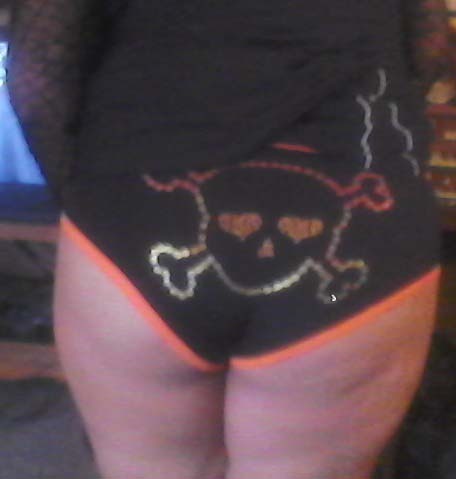
I have a big butt, and I cannot lie.
I quit smoking one year and three months ago. About a week ago, I cut back on my massive intake of coffee, so that I am down to only one cup a day, in the morning. I have supplemented my former cups of coffee with glasses of plain water and cups of hot tea. Right now I am drinking a cup of green tea with sliced fresh ginger in it. My body is kind of high maintenance. It has been since I was a colicky baby, but it became even higher maintenance once I hit puberty.
Most women with endometriosis don’t experience symptoms until their thirties, but mine started when I was sixteen. By the time I was nineteen years old, a sonogram spotted an ovarian growth of some kind approximately 3 times the size of my ovary. I was twenty-one when a laparoscopy diagnosed it as Stage IV endometriosis, and I had to have the tumor, and one third of that ovary removed. The removal of my endometrial tissue packed fallopian tubes, which were more likely to give me a dangerous entopic (tubal) pregnancy, was voluntary. The doctors also scraped out as much as the excess endometrial growth and fibroids as they could, but despite all of this I was destined to spend the next twenty years in unbearable pain for seven to ten days a month.
Now I am out of pain… due to medication. Medication that is known to cause significant weight gain in a quarter of the women who use it, and that is Depo Provera. Since I am using it for medical reasons, and not as a form of birth control, I don’t really have the option of just getting off it and using another form of contraception. Depo Provera isn’t the only medication I need to take regularly for my medical issues known to cause weight gain.
I am a lot happier being healthier that I was in my youth. I am happy to be out of pain.
Unfortunately, I am learning that people can be very judgemental about the weight of other people. Over the past two months, I’ve been pretty bumped out about statements I’ve seen people make about weight on Facebook, of all place. One guy expressed that there was something wrong with making fat people feel good about themselves, because fat is unhealthy.
Twice, I was told that none of the things that science says makes it harder for me to lose weight: my family history of morbid obesity (yes: not just the regular obesity, morbid obesity), my race, my gender, the medications I am forced to take, the weight gain associated with my stopping smoking last year (twenty pounds, by the way) really matter, because I have to take responsibility! I have to eat less, and exercise more! What right to I have to just be okay with my big fat ass? Why does it matter if my boyfriend (who is currently also overweight and has a pot belly) likes my big ass and my DD bra size? What right to we fat ass, lazy, sedentary life having, TV watching, pizza eating lard asses have to be all happy and content, and how fucking dare us? That shit is unhealthy!
Whoa.
You know, it’s not more unhealthy than smoking was, and it’s not more unhealthy than me not taking my medications would be, and yes… when I get around to it, I’ll exercise more. I say exercise more because I am already eating less, just to maintain my weight and not gain more weight. Yes, I do watch what I eat, but I’m still fat. No, I do not exercise enough. Yes, I could lose some of the weight and offset some of the metabolic changes that my medication and middle age are causing, but it’s going to take some time. I am going to have to make some adjustments.
Do you hear me crowing about how I quit smoking and therefore all of the other people who are still smoking should get willpower like I did and just stop? Hell no, because I would be a jack ass to now pretend like it wasn’t really, really hard just because I’m on the other side of it. And if you have a family history of obesity, but you lost weight, that’s awesome, but seriously acting like I don’t have any “personal responsibility” just because I chose to focus my “willpower” on some other stuff – you know, like not smoking- is being a self-righteous pompous jackass and acting morally superior. It’s not helpful. Nagging never helped any one to do anything except for get nervous and feel shitty.
There is something deeply disturbing about the ongoing campaigns to pit women of various body sizes against one another, and something I find equally disturbing about the logic that we somehow have the right to be deeply concerned with whether or not someone else – not always, but usually a female someone else – looks “healthy” and is “too fat” or “too thin.”
I am not saying that no one ever bothers a guy about his weight; I am just saying that no one is circulating paired together photos of Jack Black and DJ Qualls around Facebook asking people to comment on who is “hot” or “not” based on their relative weights. The weights of women seem to be of great concern to everyone, if Facebook is to be believed: strangers on the Internet worried that Lee Ann Rhymes is skinnier than Marilyn Monroe, strangers at fan conventions who think that girl’s original series outfit is too short, and strangers at the local Walmart. Oh… and most of the time, they are female strangers, looking to police the body size and clothing choices of their gender.
There is a societal double standard that allows for a far greater range of possible body types for men that are considered within the range of the common or unremarkable when compared with the narrow range of body types for women which have in modern times, been considered acceptable. My body has been several sizes since I reached my full adult height of 5’6 – it’s varied between size 7 (dress) and size 16 (dress) over the years – you can add two sizes to those for pants because at all times, my bottom is two sizes larger than my top so size 9 (pants) and size 18 (pants). But anyway.
I usually try to stick to the subject of writing, and avoid opining on political matters on this blog, although there are times when I do feel inclined to add my voice to the many out there on matters of current affairs. This is one of those times. I feel really weird about the fact that on one hand, liberal people are defending my rights to “my body/myself” when it comes to choosing to use birth control, but when it comes to how and when and if I decide to exercise more it’s like some creep Demolition Man (yeah, that movie with Sylvester Stallone and Dennis Leary) movie where the Politically Correct people have taken over, and are going to tell you to stop eating meat and exchanging bodily fluids because you’re not grown-up enough to be allowed to make decisions about your own health, or to do anything that might risk your body getting ill, because your body is way more important than your free will.
If you care about me and my weight, then invite me to go for a walk with you, or to the Y.
Don’t make me feel like a lesser human being with weak will power who is lazy. Joslyn Corvis called me the hardest working woman in horror. I am not remotely lazy, I work my butt off. I have a dayjob, go to school, and churn out blogs and books and stuff, and sometimes I get so caught up in writing I forget to do sit ups and floss.
Yes… I would eventually like to not weigh 240 pounds. I would like to weigh 165 pound, I think that would be better. 75 pounds is like, a shitload of weight to lose, and it will take time, and in the meantime, I would like to feel good about myself. I would like not to be told that it’s not okay to feel good about myself because I am a fat person. I am totally the same human being as I was when I weighed 125 pounds, m’kay?


June 4, 2013
Interview with Paul Loh, author of “The Greater Number”
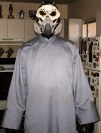 Paul Loh is an ex-Navy submariner. He is a horror author, and a musician in the band, Chief Loh. He has been an amateur paranormal investigator, comic strip artist, stand-up comedian, improv comedy troupe actor, children’s book writer and illustrator, poet, English tutor, pizza delivery driver, teacher’s aide, faux painter and movie extra.
Paul Loh is an ex-Navy submariner. He is a horror author, and a musician in the band, Chief Loh. He has been an amateur paranormal investigator, comic strip artist, stand-up comedian, improv comedy troupe actor, children’s book writer and illustrator, poet, English tutor, pizza delivery driver, teacher’s aide, faux painter and movie extra.
“The Greater Number” is not his first zombie story. He is the author of ’The Nocent part 2: Advent of the Scathing’.
The Book
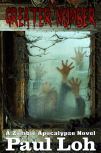 Zombies are running rampant all over the world. They’ve been reduced to their basest instincts and can tell the living from the dead by the smell of fear. They behave like animals with a pack mentality.
Zombies are running rampant all over the world. They’ve been reduced to their basest instincts and can tell the living from the dead by the smell of fear. They behave like animals with a pack mentality.
A man who thinks he has been chosen by fate to lead them has no fear. He believes he is the Hand of Karma, sent to rid the world of humanity’s evil. Can anyone stop him?
Cover Art (c) Steve French.
The Interview
Q. What is the significance of the title “The Greater Number,” what does it mean and how did you come up with the idea?
A. I have heard the dead referred to as the greater number because there are always more of them than there are of us. Well, in a zombie apocalypse, the ratio is much more skewed and the contrast, far greater. I wanted to come up with a zombie book title that didn’t contain the words zombie or dead in it. I had also done this with my first zombie book, ‘The Nocent part 2: Advent of the Scathing’. There’s a sense of poeticism, as well as a sense of despair in the title, ‘The Greater Number’. The dead have almost always outnumbered the living, but that isn’t a problem usually. It isn’t until the dead go about actively recruiting the living into their ranks that this becomes a problem.
Q. Your book is written in the first person from the perspective of your protagonist, Hewlett Fen-Chang. What can you tell us about him?
A. Well, with me being half-Chinese and half-Korean, I always tend to put Asians in lead rolls in my stories. ‘The Nocent part 2: Advent of the Scathing’ had Jeffrey Ahn, among others. I guess, as they say, you write what you know. Hewlett basically reacts to the events of the story in the way that I might if I was in his shoes. Perhaps it’s a lazy way of writing, but I do try to add different characteristics in the supporting cast. I mean they’re not all a bunch of ghetto redneck Zen geeks (which, by the way, is what Jeffrey Ahn describes himself as).
Q. Did writing from the first person perspective create any challenges for you when it came to introducing overarching concepts about what is going on in your story in terms of a zombie apocalypse?
A. Again, you’ve got some lazy writing here on my part. The whole book isn’t from the first person perspective. I only use that in the scenes in which Hewlett shows up. The rest of the chapters are from the third-person perspective. This all has to do with the way in which this story came about. One night I had a dream about being in a small town and meeting a crazy old Asian lady who kept saying, “Chee kon yeh mom weh.” The next morning, I wrote out the events of the dream. With the addition of names and some dialog, this dream transcript became the first chapter of my book. I am a big fan of David Wellington, who first put out his books chapter by chapter online. I decided to follow that format. I created a blog into which I briefly described what my objective was, and then put out the first chapter. Every week on Monday and Friday I wrote a new chapter and posted it online. It was a very stream-of-consciousness project. I typed it straight into the blog. I had no idea where the story was heading or where it would end up, but I just kept writing it and feeling intuitively where I thought it should lead. I believe it took me around four months to complete the book. Once it was all out, I collected all the chapters, proofread them, added a cover and put it out for Kindle on Amazon.com.
Q. Apocalyptic zombie stories are very popular these days. Why do you think that is, and how is your story different from the rest?
A. I think it’s both a blessing and a curse that zombie stories are so popular these days. I’ve been writing about zombies since the 80′s. It’s a blessing in that my writing might actually have a halfway decent chance of getting noticed by somebody in this climate. It’s also buried amongst an avalanche of other stories, many of which are indistinguishable from one another. Just like any other trend that comes and goes, there are a lot of Johnny-come-latelies whose hearts aren’t really in the stories. I remember about a decade ago when swing music suddenly had a huge upswing in popularity. All of a sudden, there were a dozen swing bands out there. Where did they come from and where did they go? Once the fad died out, only one or two remained. Unfortunately, there could end up being a zombie backlash in which the public becomes sick of zombies and those of us who loved them before they were popular will have that much more of an uphill battle to stay relevant.
Q. Where do the walking dead come from in your story?
A. A lot is involved in the origins of the undead in my story. I would actually be giving away about 60% of the story if I reveal it here. Suffice it to say, it involves history, anthropology, crypto zoology, science, the Bible, aliens and a bumbling Japanese millionaire.
Q. The villain of your piece is Hadji – or is he a villain? He feels he can work together with the dead to eliminate all evil. How is that supposed to work, and why don’t the dead just eat him?
A. The dead have been reduced to their basest instincts. They have an enhanced sense of smell and can tell the living from the dead by the smell of fear. They also travel in packs like wolves. Hadji, who does not fear the zombies, has become the leader of a pack of zombies. He leads them to fresh meat. To the zombies, he is a good leader because he knows where to find people to eat. To him, the zombies are loyal followers who do his bidding because in his mind, if you have any fear, it is because you have something to hide. If you have something to hide, it is because you know that it is wrong to do and you do it anyway and are therefore evil.
Q. Who or what are the “Hand of Karma” in your book?
A. Hadji thinks of himself as the Hand of Karma because of his belief about what he is accomplishing by bringing the zombies to kill people. Hand of Karma also refers to the disillusioned living people who follow Hadji as a visionary cult leader. They believe that the people that are being killed by the zombies are paying for their sins. Karma is rearing its ugly head, and they are the hands and feet of Karma, dealing retribution to the bullies of the world and so forth.
That’s one thing about me is, I’ve always had a soft spot for the underdogs of the world. I was a teacher’s aide who worked with special needs children of all sorts. There were those who had physical disabilities, mental disabilities and whose families had financial difficulties. I, myself have bipolar disorder among other things. Some of the most heart-warming stories out there are about the underdog finding inner strength. But there is also the darker side of that very story. There are those who turn to hatred and anger instead of inner strength to overcome adversity. In a zombie apocalypse, humanity itself becomes the underdog. It’s just a matter of which energies within yourself you use to fight with. Many of those in the Hand of Karma have been bullied and stepped on by the very people that are now being ripped to shreds by the zombies. They believe this to be their come-prance. This is their day of glory, revenge and retribution.
I’ve always gravitated to stories of the underdog. There is a certain isolation that one feels when one’s body or mind do not have the natural ability to compete with those perceived as being fully able-bodied. It takes heart and spirit, which will always triumph over body and mind, to get back up and keep going. Stories that depict that isolation have always appealed to me. The movie, ‘Alien 3′ was probably the least appreciated of the series, but it was my favorite. These people had no one to count on, but themselves and they had to learn how to work together or face death. Star trek’s ‘Deep Space Nine’ also had a group of people isolated on a space station. The Bajorans were the underdog when it came to the Cardassians, but they were able to gain their freedom. ‘Anne Frank: The Diary of A Young Girl’ was the story of how a family deals with forced isolation. The Jews were the ultimate underdogs when it came to the Nazis, but they too were able to gain their freedom. George Romero’s ‘Day of the Dead’ is often thought of as the least of his ‘Night of the Living Dead’ sequels, but it is my favorite. Here again is a group of people isolated underground that must work together in order to survive.
Q. Is your book the first in a series?
A. I am currently working on ‘The Greater Number 2: Devoid of Souls’. The trilogy will end with ‘The Greater Number 3: Sleep of the Dead’. Following that will be a collection of short stories, ‘Tales From The Greater Number’, expounding on certain incidents hinted at in the books.
Q. Is there anything else that you would like our readers to know about that we haven’t covered already?
A. I would just like to leave our readers with this thought: zombies force us to face our own mortality. You can’t just add the word ‘apocalypse’ to any Hollywood monster and have it make any sense. Whoever heard of the ‘werewolf apocalypse’ or a ‘Freddy/Jason apocalypse’? The only reason most people in slasher flicks don’t survive is that they act in a tactically disadvantageous manner. A smart person can easily escape a man in a mask with a knife, but it is much more difficult to survive when the threat is all around you and will stop at nothing to kill you. Believe me, I love a good slasher flick as much as the next man, but nothing quite connects with me on such a deep level as a good zombie story. To all the real zombie story lovers out there, I’ll keep writing them and I’ll keep reading them if you keep writing them too.
Where to Find Paul Online:


June 1, 2013
Interview with Nathaniel Brehmer, author of “Bully”
 Nathaniel Brehmer is the award winning author of the American Vampires trilogy, the novels Requiem and the Pumpkin Patch, Bully, and the short story collection In the Dark. His latest novel, Nightmaria, is the first in a five-volume dark fantasy series. He currently lives in Maine.
Nathaniel Brehmer is the award winning author of the American Vampires trilogy, the novels Requiem and the Pumpkin Patch, Bully, and the short story collection In the Dark. His latest novel, Nightmaria, is the first in a five-volume dark fantasy series. He currently lives in Maine.
He has had fiction published in Dark Gothic Resurrected Magazine and Sanitarium Magazine, among others. He is a graduate of the University of Maine at Farmington.
The Book
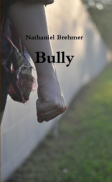 Aaron has a bully. Every day, after school, a boy named Joshua Burroughs beats him up. He can’t run from it, and he can’t make it stop.
Aaron has a bully. Every day, after school, a boy named Joshua Burroughs beats him up. He can’t run from it, and he can’t make it stop.
When Aaron sees Joshua come to school bearing his own bruises, he tries to befriend the bully and from there things only get much worse.
He is sent to a clinic for boys who have suffered extreme trauma, where he examines the lives of everyone around him in order to prove to himself that everyone is afraid of something, and that he is not alone.
The Interview
Q. Your latest book, “Bully,” is about Aaron, a kid who is being bullied in school. Bullying is a popular topic in juvenile and young adult fiction – would you consider your book to occupy either of those realms?
A. Actually, Bully was originally intended as young adult fiction, but the more I thought about it, the more I wanted it to be an honest depiction of youth in our current culture (in which bullying is almost promoted) and take a look at the sort of things bullying can truly entail, and so the book I have now is not young adult fiction by any means. It is a coming of age story, but in it I am looking at coming of age through the dirtiest lens I’ve ever used, if that makes sense. There’s nothing held back in Bully for the sake of a younger audience. To do so would, I think, be a disservice to the story.
Q. ”Bully” is not strictly speaking, traditional horror, but it does seem to have the some suggestion of psychological horror. Do you think it’s connected at all to that genre?
A. I would not call Bully horror, really, but it is at its core a book about fear. Aaron is afraid. Joshua, the bully, is afraid. He’s afraid of everything. The children are afraid and the adults are afraid, so horror has a presence in the book as it does in honest, every day working-class life. But it does not define the book like it has for some of my other works that I would certainly say are horror through-and-through. As for psychological, well, Aaron spends the majority of the novel in a treatment center for boys who have suffered a severe trauma. A trauma that Aaron refers to as his death, even though he did not actually die.
Q. Are all of the monsters in “Bully” the human kind?
A. Yes, all of the monsters in Bully are humanand none of them are clearly defined. It’s weird to say, and I wasn’t overly expecting it, but I’m happy to look at it now and be able to say that Bully is a very adult book about youth. Joshua Burroughs does some of the most horrible things I’ve ever written, even compared to vampires and ghouls and whatnot, and yet I think there’s a tremendous amount of sympathy for him. Abuse is a never-ending cycle. The bully is never at the top of the food chainand we see that very clearly through Joshua. The abuser is always abused, in some form or another.
Q. What made you choose to write it from the first person perspective, in your protagonist’s voice?
A. Truth be told, one of the major reasons for telling Bully in the first person was the fact that I’d never done it before in a longer piece. It’s my first first-person novel. I’d used it in a lot of short stories, and I do enjoy it, but it had never felt right for any of the books before this. With Bully, though, I wanted to experience everything Aaron experienced, to have the reader go through it with him and understand everything that he felt. It simply made perfect sense to live inside of this character for the duration of a book. Even though he does do some third-person narration of his own.
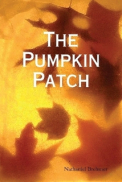 Q. Previously, you wrote “Pumpkin Patch,” about an ancient evil. Can you tell our readers a little about that?
Q. Previously, you wrote “Pumpkin Patch,” about an ancient evil. Can you tell our readers a little about that?
A. The Pumpkin Patch was an idea I had about two or three years before I wrote it down. I’d always clung to certain beliefs and rituals and otherwise regarding Halloween as a child. It was and still is my favorite time of year. It was actually kind of sacred to me, so I guess it makes sense that Pumpkin Patch is also my book about religion. But then I got to college and, well, things are different there. Halloween takes on entirely new meaning. And it sort of forced me to look at what Halloween had actually become instead of looking at it through these nostalgia goggles. Yes, there are the slutty costumes, but the pranks aren’t in good fun anymore, none of it is. I realized at some point I couldn’t determine, the treat had been taken outand trick was all that was left, and it began to eat at me, this notion of, “what if Halloween was a thing? What if it was alive? What would it think about all of this?” I figured it wouldn’t be very happy, but then I thought, “What if it made people answer for this?” and that is truly where the book began to form.
Q. You’ve also been quite prolific in writing a vampire trilogy and several short stories. What would you say keeps you inspired?
A. I’ll keep writing the ideas as long as they keep coming, and they hopefully will for some time. Luckily, the ideas seem to pace themselves out. If I’ve just come off a couple of novels or screenplays, I’ll write through a few short stories. American Vampires seems to be the well I always go back to, maybe because it was the first long work I ever finished. That world and those characters have grown a lot and continue to be very important to me. As for ideas, writing has always been what I do to keep myself sane, so I guess some of it comes from the things that drive me crazy. I read a lot of articles about resurgence in bullying in school and teenage suicide before Bully wound up pouring out of me. And American Vampires is at its core about both morality and intolerance, because these are things I’ve always been interested in exploring. Sometimes I just see a character, or draw them. Very frequently I’ll have a scene come to me, and I’ll become curious about it, need to know the rest, so that’s a common starting point as well.
Q. Can you tell us a little about “Kane,” the novel you are currently working on?
A. Kane is a return to the world of the American Vampires trilogy.
Even though I brought that to a close, I had always planned on taking the character of Roland Kane out on his own and really exploring him in a way I hadn’t had as much a chance to do in the large ensemble cast of the American Vampires books. It’s been a few years since the end of the trilogyand a lot has changed. Over the course of those books, America was driven into a corner and forced to announce the existence of vampires, and a war followed, and now vampires are sort of trying to integrate into a society that just wants them to be movie monsters. People don’t want vampires around and just wish they never had to know about it. Nobody hates vampires more than Roland Kane. They killed his wife, he thinks they killed his unborn daughter, and for years he killed vampires for money, back before they were outed. Now he can’t really do that anymore. More than that, in the third book of the trilogy, he let a vampire live for the first time in his life, and that’s our jumping off point for the character in this book. The world’s changed, and the question is, has Kane changed? Will he ever? And it’s been fun to explore. I’m tweaking the final edits on it now, but I would look for the book to be published in June.
Q. Is there anything you would like to tell our readers that we haven’t covered yet?
A. I always have a thousand things going on if I can help it, but to be brief… let’s see. The first big thing is that I am developing American Vampires as a web-series. Very low budget, but the story is thereand I have confidence that it can be something pretty special. It loosely follows the story of the first book, with some changes made for story and format. The first exteriors have been shot for the first episode, and I’m currently finalizing the crew and beginning work on casting. The teaser trailer has just been released and can be viewed on YouTube, at the American Vampires Facebook page (www.facebook.com/pages/American-Vampires) and my Goodreads author page. On top of that, I’m developing a comic book titled BITCHFIGHT, which is about an all-girl Catholic school that is secretly a training facility for girls with supernatural powers. I’m very passionate about this and excited to deliver a group of kick-ass young ladies whose costumes don’t consist entirely of strategically placed armor and a thong. I’ve written much of it, I only need to find an artist for the first issue so I can get that rolling. So, any artists out there, not to sound needy, but I love you dearly, help me please. And other than that, there’s Cities of Ash: Nightmaria Book Two on the way later this year,second part of a five-book epic fantasy series.
Where to Find Nathaniel Online:
http://www.lulu.com/spotlight/nathaniel_brehmer
http://www.goodreads.com/author/show/5426101.Nathaniel_Brehmer
http://www.facebook.com/BadMeatisPractice


May 29, 2013
Why I just canceled my Kickstarter program
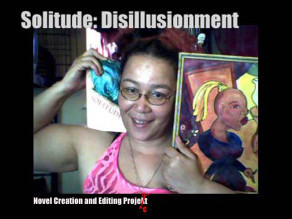 I spend a lot of time writing, and this is not a new thing for me, but is more like a life pattern. I am able to express myself better in writing than I am in spoken communication. There are fewer distractions in writing. Yet, for all of my love of writing, and my consistent plugging away at it, my writing is not perfect. I am like many other people in that I am unable to see the flaws in my own work as easily as I can see the flaws in the work of others.
I spend a lot of time writing, and this is not a new thing for me, but is more like a life pattern. I am able to express myself better in writing than I am in spoken communication. There are fewer distractions in writing. Yet, for all of my love of writing, and my consistent plugging away at it, my writing is not perfect. I am like many other people in that I am unable to see the flaws in my own work as easily as I can see the flaws in the work of others.
The time when I am most easily able to detect flaws in my own writing is when I am reading it aloud. I realized that when I was in Writing Workshop at school, and I had a student tutor point out a missing word in a sentence in one of the papers I had due for my finals. It is easy to make typographical errors, but it is hard to notice them when you’ve envisioned a complete sentence in your mind. You still see what you were thinking of when you created it. That is my issue.
The nature of the Kickstarter program was as follows:
I intended to secure the funding for better editing for my s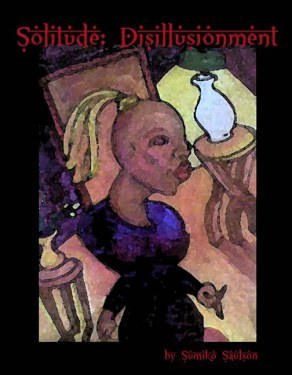 equel to Solitude, which will be called Solitude:Disillusionment, by offering rewards that would be essentially equal to or slightly better than the price of the book if it were purchased outright. In other words, the rewards were approximately the same as a paperback, or hardcover, plus domestic shipping and handling. That’s not the same as advance purchasing, but advance purchasing does work similarly.
equel to Solitude, which will be called Solitude:Disillusionment, by offering rewards that would be essentially equal to or slightly better than the price of the book if it were purchased outright. In other words, the rewards were approximately the same as a paperback, or hardcover, plus domestic shipping and handling. That’s not the same as advance purchasing, but advance purchasing does work similarly.
I would have then used the money from these essentially advance purchase like commitments from readers. That way I could make sure I was going to get enough money to pay for proofreading human beings and software, to ensure a better edited product.
But after two weeks, not a single person committed a single dollar to this project.
I take that as a sign.
It is a sign that I should let go of the idea that it is important to have better editing at this stage in my career than I have access to. There are many things I do not have access to, but I am a very determined person. I am a very poor, determined person who lives in a studio apartment with a fiance and two cats in a not so great neighborhood in one of the most dangerous cities in the USA, Oakland, California. You can Google that, but on that list it is number 13. This is who I am, and this is what I am working with: poverty, disability, and a low woman on the totem pole position in a number of different types of privilege. I can not afford for my shit to be perfect, and I just have to keep on trudging along.
So that is the plan, then. Not to give up.
This doesn’t mean there won’t be a Solitude: Disillusionment. It just means that the editing and proofreading are going to be done by friends, volunteers, and when I sell enough books $1 a page proofreaders that make their services available to independent writers like me. I am going to just have to accept it. This is how it is.
I can’t even afford an oil change for my 20 year old car.
I’m doing the best that I can.


May 28, 2013
Interview with Nicky Peacock, author of “Bad Blood”
Nicky Peacock is a British author living in the UK who has had short stories published/ being published in five countries: UK, USA, Canada, Ireland and Australia. She writes: horror, paranormal romance and supernatural YA fiction and has dabbled in Sci-Fi, Fantasy, Paranormal Noir, Urban Fantasy and Dystopia. Most of her work is available through Amazon.com and Amazon.co.uk. She is a proud member of the UK’s Society of Authors. She runs a local writers’ group called Creative Minds
The Book
“I am Britannia. I am your protector. I will fend off the hungry hordes of undead hands that reach toward you. I am your steadfast defender. I will stand between you and the zombie masses as they try to taste your flesh. I am strong, unyielding, and dedicated to your survival. All I ask from you… is your blood.”
A five-hundred-year-old bloody game of vengeance will need to be put on hold if vampires are to survive the zombie uprising. Britannia and Nicholas, bitter enemies and the only two surviving vampires left in London, have to work together to save un-infected humans and deliver them safely to a vampire stronghold in the Scottish Highlands. Unable to drink the zombie “bad blood,” the remaining vampires need the humans to stay alive. But will the vampires tell the survivors who they are and what they want from them? Will Britannia be able to hold back her vengeance for the greater good? Is survivor Josh the reincarnation of Britannia’s murdered true love? And can she bring herself to deliver him to the “safe” hold? Survival instincts run deep, but bad blood can run deeper.
The Interview
Q. What is like writing horror for the young adult market, and how does it differ from adult horror?
A. I love the amount of YA books on the market – and written right, they don’t have to just appeal to teens. The traditional differences between YA and adult literature are in the absence of sex and the lessening of violence. Although I ensure that sex isn’t included in my YA work, I don’t hold back on the violence – If I did, the horror would be diluted and the whole thing would just come across patronizing to the reader.
The other aspect to consider, is swearing. It’s a real debate as to whether to include it in YA literature. I tend to air on the side of – when warranted. It’s incredibly unrealistic to have characters in dangerous situations that don’t drop a few F-bombs here and there!
Q. Zombies and vampire are both iconic representations of the undead in horror and dark comedy, but we rarely see them together in the same story. Was it fun mixing zombies with vampires in “Bad Blood?”
A. It was great – like you said, for some reason this rarely happens. I’m not sure why, as they blend together so easily. A vampire against a zombie horde is quite a meaty battle, and I did introduce an infected vampire into the mix too – to make it even meatier! It’s also clear that they would be enemies fighting for the same food source. You’ve also got an interesting question of whether a brainless mass could overpower one intelligent being.
Q. The idea that a zombie outbreak would taint the vampire blood supply is a pretty cool one. How did you come up with that?
A. I had to move the story along quickly. If a real zombie uprising occurred, it would start off quite slow as one person got infected and then they infect another and so on. It would probably take 3 days for it to get going. I wanted an instant problem for the vampires and so I had the blood at the hospitals tainted. That meant that not only would it cut off a more convenient food source for the vamps, but also would make the zombie virus get out quicker with more infected people through blood transfusions. But the question still stands – who orchestrated the ‘bad blood’?
Q. There is a suggestion of romance in the story. Do you consider “Bad Blood” to be a paranormal romance, or is the question of Josh as a possible reincarnation of Britannia’s one true love a secondary plot point in an overall horror story arch?
A. I love a bit of romance in the bubbling plot pot! It is secondary to the horror though. To be counted as paranormal romance, you have to have the romance as the main plot. I needed something to dull the main character, Britannia’s reactions and also to show the reader a more naïve side of her – hopefully something they can identify with. She’s been in love with the same man for centuries – day dreaming about him. We all know how dangerous day dreams can be when it comes to relationships – dream men have no faults. So she could be in for a rude awakening, or maybe Josh is what he appears to be…
Q. Do you consider Britannia a strong female protagonist, and do you think we are seeing more of these in horror?
A. Britannia is strength incarnate – she kind of had to be to deal with the amount of undead, grabby, bitey flesh that I throw at her. We are seeing a lot of strong female protagonists in this genre – you’ve got Laurell K Hamilton’s Anita Blake, Charlaine Harris’ Sookie Stackhouse, Carrie Vaughan’s Kitty and soooo many more. I think the foppish, weak willed girls of YA horror are annoying and don’t push the story on as quickly as they should. And they, by the writing law of Darwin, would die quicker – weak spines crack easier.
Q. How did Britannia and Nicholas become such bitter enemies?
A. Nicholas made Britannia a vampire against her will. He kidnapped her from her beloved fiancé, murdered him and then held her captive for 20 years in an attempt to make her fall in love him. When she was freed, she was stronger, harder and became the vampire she needed to be to be able to deal with that trauma. She declared war against Nicholas and any vampire he might make. Before Nicholas, Britannia was Brianna – so he had a profound effect on her whole persona.
Q. Britannia’s relationship with the uninfected humans is pretty complex. How does she feel about them? Does she feel that there is any duplicity in the vampire desire to protect humans as their food source, and does she feel it is necessary to be honest with the humans? How do other vampires feel about that?
A. Each vamp will have their own thoughts on feeding from humans. In Bad Blood, there is no other option for them, they can’t drink animals and certainly can’t drink zombies. The do however have a choice as to whether to kill their prey, or simply take what they need. The latter was dangerous before, as they can’t glamour people into forgetting an attack. Post zombies, this offers a bit more flexibility. Humans take whatever protection they can to get by, and the vampires try not to be too specific as to what and who they really are – although there are a lot of wild theories that people put about! Britannia has always been ambivalent to her feeding, she kills most of the people she attacks – although she tries to keep it to evil people (in her eyes) When she starts fighting alongside humans, she sees things differently.
Q. Is “Bad Blood” available in print, or just as an eBook, and what do you think about eBooks, and how they are making a larger selection of authors available to readers?
A. It’s available in both print and eBook. Although, I never thought I’d say this, I’ve come to love eBooks. My kindle is my fav gadget right now. From a money-grubbing author point of view, eBooks yield better royalties as there are less costs involved with producing them – but there is still that massive rush involved with seeing your name in print.
Where to Catch Up with Nicky Online:
Blog: http://nickypeacockauthor.wordpress.com/
Twitter: https://twitter.com/nickyp_author
Facebook Page: https://www.facebook.com/NickyPeacockYaBooks
Amazon Author page: http://www.amazon.com/Nicky-Peacock/e/B007UH2ACW/ref=ntt_dp_epwbk_4
Good Reads: http://www.goodreads.com/author/list/4958833.Nicky_Peacock
Pinterest: http://pinterest.com/nickypauthor/
Tumblr: http://nickypeacock.tumblr.com/
Website for my Writers’ Group: http://www.creativemindswriting.co.uk


May 27, 2013
Thoughts on this Memorial Day
Sacramento Valley Memorial Cemetery, where my father Robert Allen Saulson is buried.
Memorial Day is a commemoration of the men and women who lost their lives in service of this country. Many of us also express our gratitude to the men and women who serve on this day, just as we do on Veteran’s Day. I am the daughter of a veteran, the niece of a veteran, and the granddaughter of a veteran. Although all three of these men in my family who served came home in one piece, neither of them were the same.
My mom and my grandfather 1967
My grandfather, Leon Mathews, came home from Korea with a broken mind. They didn’t know a lot about PTSD, or as they called it back them, shellshock, and so when he began exhibiting signs of paranoia and yelling at people who were not there, he was diagnosed with schizophrenia. My grandfather probably was not schizophrenic: men do not usually start exhibiting signs of schizophrenia in their thirty. I am grateful that my grandfather came home, although he was deeply affected by the war. My mother and my aunts and uncle were deeply affected by my grandfather’s illness: my mom is the oldest,and she was twelve when he came home.
My dad in his navy uniform, with his brother Jimmy.
In my English 1B class this semester, we read two book on war. One was Ceremony by Leslie Marmon Silko. It was about Native American soldiers returning from World War II, and particularly, Tayo, the main protagonist, who has PTSD. The confused narrative of the story emphasizes the state of mind of its point of view protagonist.
When I read it, I naturally thought of my grandfather, a tall, dapper black man who was usually sharply dressed with a fashionable fedora. He was born Feb. 12, 1924 and died on Dec. 21, 1993. He was a private in the Army, and is buried at Riverside National Cemetery. I couldn’t find the picture, but I did find some video from that graduation ceremony which was used as part of this 2002 documentary short I made. The video is from about 1967, and my mom is standing next to my grandfather, pregnant with me. You can’t really tell what they look like, but you can definitely recognize their fashion sense.
Carrying dad’s casket after his service.
My grandfather was part Native American, like Tayo, but he wasn’t half white. He was either half or three-quarters black, we aren’t sure, but his father was a Blackfoot out of Virginia, and he was a recognized tribe member who lived on the reservation. No one can seem to recall if my great-grandfather was also part black, but a lot of the Virginia Blackfoot were.
The Things They Carried by Tim O’Brien was the second book we read, and that was about Vietnam vets. It reminded me of my uncle Jimmy, and my dad, two other servicemen in my family. Jimmy, who was injured in Vietnam, and my father, who served in the Navy just before Vietnam was a declared war. There were already soldiers in Vietnam when my dad served, but he was a radio technician in the Navy and served in Iceland. Uncle Jimmy was shot before the helicopter he was in even had a chance to land in Vietnam – gunfire pierced the helicopter and hit my uncle where he sat, piercing his bottom and injuring his back. He spent the rest of his life with a back injury.
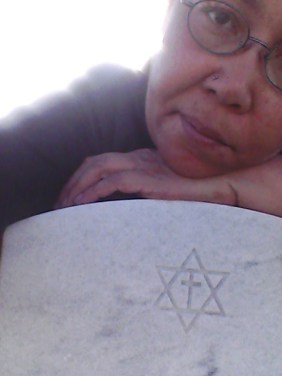 It also reminded me of the many soldiers who I’d met over the past decade who served in Iraq and Afghanistan. The men who came back, and their memories of their friends who didn’t come back. I can not imagine how hard it is for a man to watch another man die in front of his eyes: any man, a stranger, an enemy, but especially a friend, someone he worked and lived beside day after day. Like in Vietnam, many men returned with an anti-war sentiment. Many of them returned with PTSD, like my grandpa.
It also reminded me of the many soldiers who I’d met over the past decade who served in Iraq and Afghanistan. The men who came back, and their memories of their friends who didn’t come back. I can not imagine how hard it is for a man to watch another man die in front of his eyes: any man, a stranger, an enemy, but especially a friend, someone he worked and lived beside day after day. Like in Vietnam, many men returned with an anti-war sentiment. Many of them returned with PTSD, like my grandpa.
Today, in honor of the men who died in service, people will go to the military gravesites and put flags on each grave. We will honor those who died in service, and those who died years later, like my grandfather, and my father, will also get flags on their graves. Some of those men who didn’t die in the war, will be like my grandfather. Like so many much younger men I’ve met who served in Iraq and Afghanistan getting treatment, because you see, I also have PTSD even though I have served in no war, they will have carried the scars of living for years in a warzone, like Tayo in Ceremony.
Some of them will come home to families, like the men in my family who served. Others will be alone – one in three homeless men are veterans. Please remember them and their service today. Please give the benefit of the doubt to the man with the sign saying homeless veteran who is panhandling on the street, because he probably is a veteran. Remember our dead, and honor our living.
One Love.


May 26, 2013
I had fun visiting HorrorAddicts.net at BayCon 2013
Sumiko Saulson and Emerian Rich.
Friday night, I drove down to Santa Clara to go to the HorrorAddicts.net tea at BayCon 2013. I met a lot of cool people there, including Emerian Rich and two other authors. A delicious jasmine tea was served, and a host of gorgeous and probably delicious sweet treats, which I decided not to eat due to the recent declaration of my physician that my blood sugar is too high and is prediabetic. My friend Brian Muller and my fiance Gregory Hug attended with me. I saw an old friend Eli Chiaviello. With this being the thirteenth year of the convention, and the theme being T
I would post a bunch of pictures, but apparently I need a new camera phone and new eyeballs. My only picture of me and Emerian is super blurry. Fortunately, thanks to the cutesy processing available at PhotoMania I have been able to salvage it. I would just like to state for the record, that we weren’t actually standing in a window behind a cartoon cat at any point during the HorrorAddicts.net tea. Other than that, however – I would say that the HorrorAddicts.net tea was a little bit like a gothic fairytale, and I wouldn’t have been surprised if the Cheshire Cat had shown up.
Down the hall, three doors past the Klingon Slave Auctions, and to the right was the Horror Addicts tea. Fashionably attired gothic girls filled the room with fancy, fluffy black gowns and colorful hair and stripey socks complimented the array of spookily coordinated cupcakes and cookies. As the HorrorAddicts.net site says:
“Emerian and her HorrorAddicts.net crew provided the decorations this year to get the BayCon group into the spooky, horror, mood of Chairwoman Sabre’s theme: Triskaidekaphobicon, or the fear of 13 con.”
Holding my signed copy of “The Wickeds”
One of the important works of HorrorAddicts.net is the Wicked Women Writers competition. As you probably already know, if you are a follower of my blog, women remain underrepresented in the horror genre. HorrorAddicts was not only representing for the horror genre, meaningfully, during the thirteenth annual BayCon, but also for women in horror. It is a rare thing to find oneself sitting in a room having tea with three female horror writers. It is rare to find three women who write horror in one place at all.
Horror Addicts BayCon badge ribbon
My first connection with HorrorAddicts.net was during Women in Horror Month 2013. WiHM and Black History Month fall in the same short month of February, and I was putting together a list of black women horror authors when I came across David Watson’s article from last year highlighting black horror writers for February 2012. As it turned out, he was in the middle of putting together a new one for Black History Month 2013. It is through his works that I came to know and have the greatest respect for HorrorAddicts.net and all they do to promote the genre in general, and to make sure that underrepresented segments of the writer population such as women in horror and black horror writers are represented.
It would appear that the HorrorAddicts.net presence at BayCon is generating so much interest in the website that the redirect for the URL isn’t working correctly at the moment, so I would encourage all of you to visit them at http://horroraddicts.wordpress.com/ for the time being, until their regular url http://horroraddicts.net/ starts getting just a little less traffic. And of course, if you are at BayCon, or in the Bay Area, I would encourage you to go visit Horror Addicts, on the third floor, down the hall, just pass the Klingon Slave Auctions, and meet and speak to some of the most interesting people in horror fiction in the Bay Area. I had more fascinating conversations in my three hours at BayCon than I usually have in a month.
I met Laurel Anne Hill, the intelligent and informed woman behind the San Mateo County Fair’s Author Day event, which will take place on June 15, 2013 between 2pm and 4pm. I’ll be there, and so will Emerian Rich. We hope to see you there.


May 17, 2013
Interview with Pedro Barrento, author of The Prince and the Singularity – A Circular Tale
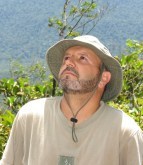 Pedro was born in Mozambique 51 years ago, attended English schools in Lisbon and pursued his education until finishing a degree in Law. When he was around 33, Pedro decided there’s more to life than being a lawyer and tried his hand at various business activities, the most successful of which was a company that produced and managed rock bands. A year ago he decided to pick up again a long-forgotten hobby of his: writing. He started with a blog, mainly dedicated to political satire. Encouraged by the feedback from the blog Pedro then decided to try his hand at a whole book, an effort which resulted in the creation of The Prince and the Singularity – A Circular Tale.
Pedro was born in Mozambique 51 years ago, attended English schools in Lisbon and pursued his education until finishing a degree in Law. When he was around 33, Pedro decided there’s more to life than being a lawyer and tried his hand at various business activities, the most successful of which was a company that produced and managed rock bands. A year ago he decided to pick up again a long-forgotten hobby of his: writing. He started with a blog, mainly dedicated to political satire. Encouraged by the feedback from the blog Pedro then decided to try his hand at a whole book, an effort which resulted in the creation of The Prince and the Singularity – A Circular Tale.
The Book:
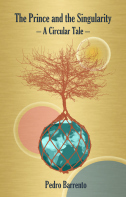 The Prince and the Singularity – A Circular Tale is a take on the Creation myth, drawing from different religious and philosophical sources and mixing them in an original, challenging and often very funny way. It is written in a multi-layered format, allowing it to be read both as a simple and entertaining fable and as a deeply philosophical work, full of hidden references and satire.
The Prince and the Singularity – A Circular Tale is a take on the Creation myth, drawing from different religious and philosophical sources and mixing them in an original, challenging and often very funny way. It is written in a multi-layered format, allowing it to be read both as a simple and entertaining fable and as a deeply philosophical work, full of hidden references and satire.
It’s the story of the Prince aka the Master aka Francis, who is more or less immortal and goes through the millennia fighting Desire and Rejection, the roots of all unhappiness and evil. He always fails until the moment he loses interest and decides to die, which he doesn’t. Instead he gets promoted.
The Interview:
Q. Along with the positive reviews you’ve received for “The Prince and the Singularity,” you’ve received some hostile remarks from users regarding your decision to mix mythologies. When you were writing it, did you set out to write a controversial work? Were you surprised by the controversy?
A. As I’ve explained in previous interviews, I didn’t really set out to write anything specific, I just had these sudden ideas for individual (non sequential) chapters. How it all ended up making a coherent story is a big mystery to me. Anyway, when it was all written down I had no idea it could be controversial, though most people would probably guess right away. I think I’m a bit naive, sometimes. It was only when I started testing the book on the Authonomy site that I understood the book could be offensive to some people.
Your remark that some people reacted adversely to my decision to mix mythologies is not entirely correct. The kind of people who were reacting badly don’t have much notion about cultures other than their own. They were reacting badly because they thought the book to be a spoof on the Bible, which it isn’t. Chapter two is clearly a twist on the story of the Buddha, but then, if you don’t know the story, you obviously will not understand the twist.
What I did was to add a Prologue that clearly defined what the story was about, and after I wrote that the problem was solved. I guess now the sort of people who were sending me “hate mail” just read the prologue, realize the book doesn’t interest them and go read something else.
Q. In science-fiction stories like Frank Herbert’s “Dune,” for example, the mythologies are often created or invented. The same is true in fantasy works like Tolkein’s “The Hobbit.” Do you think that people would have been more open to the mixture of mythologies in a fictionalized world?
A. The less people feel threatened, the less they will react against something, so obviously the more something is fictionalized, the more distant it feels from the real world, in which case only the most fundamentalist and intolerant will react against it. Rejection arises out of fear and insecurity so there is a direct ratio between the nearness of the perceived threat and the amount of reaction against it.
My book mixes philosophies from different religions and cultures that exist nowadays. That’s a lot more threatening than mixing mythologies, which are usually from cultures extinguished long ago.
Q. Do you think your book has much in common with the speculative fiction genres such as sci-fi, horror and fantasy?
A. The book has no connection to horror or sci-fi. It has some connection with fantasy although it doesn’t belong to fantasy as a genre.
The book starts with a sort of teaser which says: “It has elements of the fantastical including a prince and a damsel in distress, but it doesn’t belong to the fantasy genre.”
Q. Many literary fiction works such as Toni Morrison’s “Beloved” and “Song of Solomon” also combine mythology with a kind of surrealism generally seen in speculative fiction. Do you think that there is some crossover between the genres?
A. Crossover between genres makes a book much more interesting, in my opinion. Genres are of interest to the industry (because it makes the product easier to market) and to some readers who don’t like their reading to be adventurous and want to be sure beforehand of what exactly they are going to read. If you prefer your reading to be a bit riskier, crossover is the way to go.
Q. In other interviews, when asked about your writing process, you have stated that you believe that “all books are already written, in some other dimension. Writers get their stories when they somehow connect to that other dimension.: – that is definitely the kind of concept associated with science-fiction. Does the other dimensional concept come into play at any point in your novel, “The Prince and the Singularity”?
A. I don’t think that is correct. It’s not associated with science fiction, it’s associated with chanelling and new age concepts. The whole book is a mix of new age, fantasy and twists on established philosophical concepts.
Q. Without any spoilers, can you tell us a bit about the nature of this singularity in the title of your book?
A. The singularity is a mathematical concept that is part of the Big Bang theory. “The Prince and the Singularity – A Circular Tale” is a title which is supposed to evoke images that clash with each other. On one side, there’s The Prince, which sounds Disneyesque, immediately followed by a mathematical entity. It totally reflects the way the book mixes all sorts of things in an unexpected way.
Where to Find Pedro’s Book Online:


May 15, 2013
BayCon – Triskaidekaphobicon
I am going down to Santa Clara on Friday the 23rd to visit BayCon – Triskaidekaphobicon and meet Emerian and the other cool people at the HorrorAddicts.net tea! Hope to see you there!





